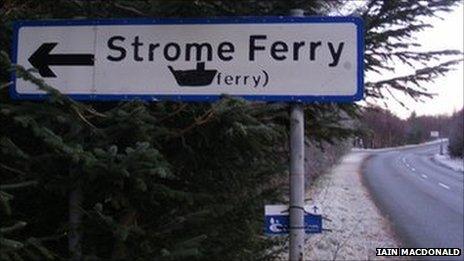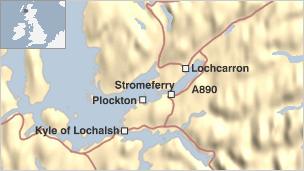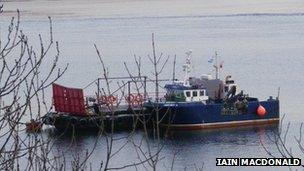Solution to A890 in Wester Ross could cost £70m
- Published

A boat has been painted over the word "no" on the Strome Ferry road sign
A solution to overcoming a problematic Highlands road could cost up to £70m, a senior councillor has said.
The A890 in Wester Ross has been shut since a landslide on 22 December and could remain closed for a month while the hillside next to it is made safe.
A boat that takes tourists seal watching has started taking children to school in Plockton due to the closure.
Councillor John Laing said Highland Council was considering long-term solutions to the road.
He told BBC Radio Scotland's Good Morning Scotland programme that the cost could be significant.
Mr Laing, chairman of Highland Council's transport, environmental and community services committee, said: "It could cost £40-70m.
"An incredible amount of money, but its an incredible hillside."
The A890 helps to connect Lochcarron to Plockton, and its high school, and eventually with Kyle, on the opposite site of Loch Carron.
The road runs across the top of the sea loch to link up with the A896, the main road to Lochcarron.
To make the journey by road at the moment involves drivers having to take a 140-mile (225km) diversion, instead of the ususal 18 miles (29km) from Lochcarron to Plockton.

About 60 schoolchildren who would normally travel by road to Plockton High School made part of the journey by train last week because of the closure.
The A890 is open as far as Strathcarron from where the youngsters took the train to Plockton.
Because of the train timetable, the pupils missed their first two periods of the day but did supervised homework before making their return journey.
From this week, 32 children from Lochcarron, 16 from Kishorn and 10 from Applecross will cross Loch Carron to Plockton by boat.
Highland Council has contracted Calum Mackenzie's Plockton-based cruiser Sula Mhor to ferry the youngsters.
Holiday passengers are offered their money back if they do not see a seal.
A small community-owned car ferry from Glenelg has also started to run between North and South Strome.
The 40-year-old craft can take six cars at a time.

A fishing boat went to the aid of the Glenachulish
Called the Glenachulish, it is the last manually operated turntable ferry in Scotland and continues a 77-year-old tradition of a car ferry crossing the Kylerhea straits between the mainland and Skye.
It had battery problems earlier and required assistance from the crew of a fishing boat before it could start offering a service.
The first car to take the Glenelg boat belonged to outdoor instructor Laurie Wardlaw.
She had spent the last four months cycling around Australia in temperatures of 30C and more.
Ms Wardlaw had not known the road was closed until she turned up and saw there was a ferry running.
A ferry service has not run at Strome since the 1970s.
Ahead of the launch of the temporary services a road sign pointing the way to Strome's slipway has had graffiti added to it.
The sign reads "Strome Ferry (No ferry)". A boat has been painted over the word "no".
Attending the launch of the school ferry run, Mr Laing said: "It has gone very well this morning.
"It's a lovely morning - cold but very clear and the sea is like a mill pond."
- Published10 January 2012
- Published9 January 2012
- Published8 January 2012
- Published6 January 2012
- Published5 January 2012
- Published4 January 2012
- Published31 December 2011